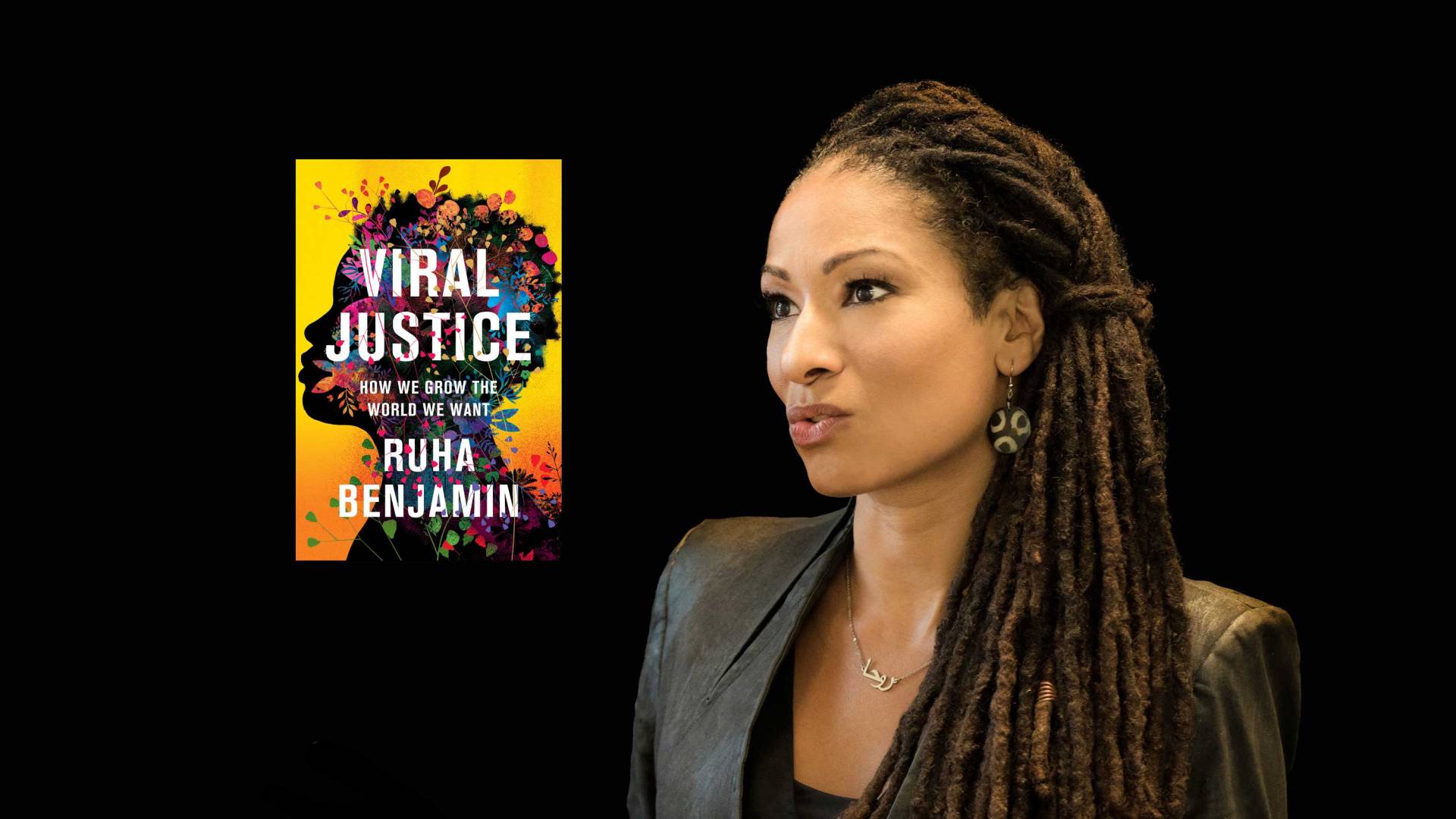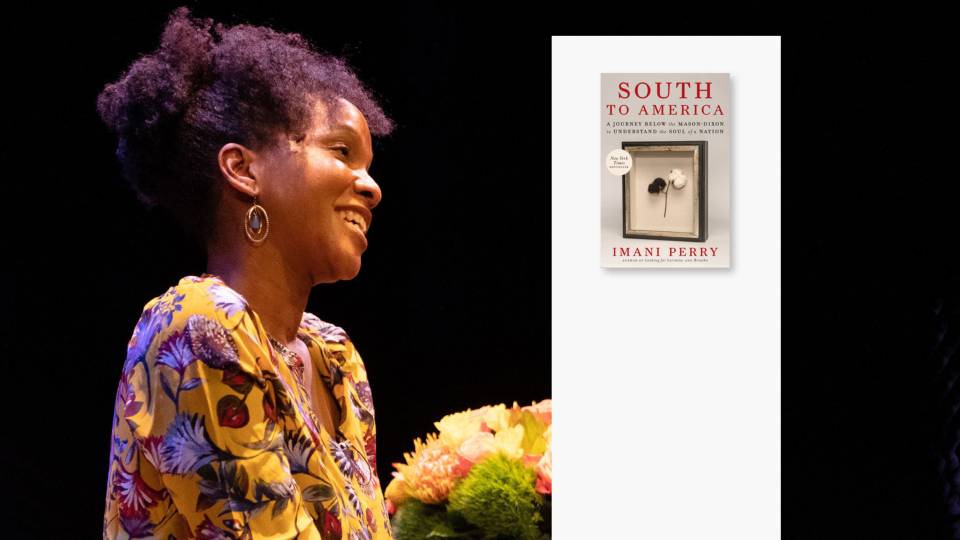In her new book “Viral Justice: How We Grow the World We Want” (Princeton University Press), written during the pandemic, Ruha Benjamin asks readers: “What if the virus is not something simply to be feared and eliminated, but a microscopic model of what it could look like to spread justice and joy in small but perceptible ways?” “Viral Justice” then invites readers to act in their own way to spread hope toward a more just world.
On Feb. 24, Benjamin received the 2023 Stowe Prize from the Harriet Beecher Stowe Center, which recognizes the author of a distinguished book of general adult fiction or nonfiction whose written work illuminates a critical social justice issue in the tradition of Harriet Beecher Stowe’s "Uncle Tom’s Cabin." The winning book applies informed inquiry, is accessible and engaging to a wide audience, and promotes empathy and understanding.
Here, Benjamin, who is professor of African American studies at Princeton, offers reflections and insights on Black History Month, along with recommended books, music, podcasts, film and more. Below that is a list of University events and resources that recognize and celebrate Black history throughout February and beyond. Read a book Q&A with Benjamin online.
How can the legacy of Black History Month fortify us when we're feeling defeated in the current moment?
There's a sign hanging in my office with the words of Octavia E. Butler: “We can, each of us, do the impossible as long as we can convince ourselves that it has been done before.”
One part of Black History Month is to recognize the extraordinary things people have done before. When I think about what we're going through now, learning about how human beings like us have worked to overcome incredible barriers is fortifying. This month gives us a chance to recall and reflect on this lineage — this tradition of Black activism, Black intellectualism, Black imagination and just Black being — that we are meant to carry on. It galvanizes the work that we do.
But Black History Month is not just about celebrating and reflecting. A few years back, a Black student in Houston saw a caption in his social studies textbook that essentially said: “Between the 1500s and 1800s millions of workers were brought from Africa to the United States to work on agricultural plantations”— it described enslaved Africans like any other workers. He took a screenshot and sent it to his mom, a Ph.D. student at the University of Houston. This textbook is completely whitewashing the torture, the violence of enslavement.
Black History Month is a time for us to recommit to truth telling, not just about Black people, but about this nation. If it's not helping us — all of us — situate ourselves in this longer tradition and cast a light on the lies that are told year round, then it just becomes this feel good exercise that hides the persistence of suffering and inequality, rather than actually challenging us to grow and become better.
Help us zero in on what we might read, watch and listen to right now.
Books: I just finished “A Handful of Earth, A Handful of Sky” by Lynell George which took me deep into Octavia E. Butler’s archive — her personal notebooks, diaries, to-do lists and affirmations — and offers a poignant look at how Butler creatively fashioned her life alongside her fiction. With students in a new course I’m teaching this semester, “Methods of Worldbuilding,” I’m reading “Of Black Study” by Joshua Myers, which shines a bright light on the lies that have shaped academic disciplines and the university more broadly and explores the work of Black thinkers who broke with the racial and colonial logics of academic disciplinarity.
Podcasts: I’m listening to a fantastic new podcast called “Griotte’s Beat” hosted by Kaytura Felix in which she talks to Black women from all walks of life and many corners of the African diaspora to learn how we tackle injustice in our everyday lives. I’m also looking forward to Season 4 of “How To Citizen,” where I sit down with comedian and cultural critic Baratunde Thurston to talk about “Viral Justice.”
Instagram: Given the ongoing revolution in Iran, I’ve been following the Collective for Black Iranians IG account more closely than usual. And for my daily dose of laughter and truth-telling I visit Professional Black Girl curated by Dr. Yaba Blay.
Film: “Neptune Frost,” (2022), directed by Saul Williams and Anisia Uzeyman, is a stunning Afrofuturist romantic musical shot in Rwanda that draws together so many of the threads I engage in my work. To the question I often pose, “Whose imagination are we living within?” this film offers a radically different answer.
Music: I am super excited to hear Danielle Ponder live at McCarter Theatre Center in Princeton with a group of friends today (Jan 10). Her song “Be Gentle” is my mantra to counteract the harshness of the world, “Be gentle to yourself, my love, my love, you can be no one else, my love, my love.”
Documentary: Right before the semester started I watched the new PBS documentary “Zora Neale Hurston: Claiming a Space” and immediately decided I had to add it to my syllabus. The film is an in-depth biography of Hurston whose groundbreaking work a century ago challenged popular and academic assumptions about race, gender and cultural superiority.
Upcoming University events and resources
The following includes a list of upcoming events open to the public from Feb. 13-March 8.
Ongoing: “Toni Morrison: Sites of Memory” will run Feb. 22 through June 4 in the Princeton University Library’s Milberg Gallery. The exhibit anchors a series of programs throughout the spring, including: An exhibition at Princeton University Art Museum’s Art@Bainbridge with the renowned artist Alison Saar; newly commissioned performances responding to Morrison’s work presented by McCarter Theatre and Princeton University Concerts; a three-day symposium that brings together over 30 writers and artists to reflect on Morrison’s relationship to the archive; children’s programming; a spring lecture series; and undergraduate courses on Morrison’s work.
Feb. 13: “Why Erica Garner Also Couldn’t Breathe: Maternal Grief and Black Politics” hosted by the Department of African American Studies and the School of Public and International Affairs. Juliet Hooker, the Royce Family Professor of Teaching Excellence in Political Science at Brown University, will talk about the key role that political mourning has historically played in Black politics.
Feb. 16: “Agency, Not Equity: A Path to Achieve Excellence for All Versus Universal Mediocrity” hosted by the James Madison Program in American Ideals and Institutions. Ian Rowe, a senior fellow at the American Enterprise Institute, will be in conversation with Ana Samuel, a graduate of Princeton University and the University of Notre Dame.
Feb. 20: “Negroes Speak of War: Black Studies, U.S. Imperialism and Public Policy,” hosted by the Department of African American Studies and the School of Public and International Affairs. Peter James Hudson, associate professor of African American studies and history at UCLA, will consider the debates on anti-imperialism through a range of institutions and organizations, paying special attention to questions of U.S. foreign intervention and the political economy of militarism.
Feb. 21: “Chef Valerie Erwin ’79 Presentation and Tasting,” hosted by Campus Dining. Valerie Erwin, a Class of 1979 graduate, is a Philadelphia chef and social activist who will lead a cooking demonstration and food tasting in honor of Black History Month. Erwin is currently the program manager of Farm to Families, a produce access program of St. Christopher’s Foundation for Children.
Feb. 21: "Malcolm X Memorial Lecture with Donna Auston" organized by the Office of Religious Life. (Location is Computer Science Building, Room 104)
Feb. 22: “Lessons of Legitimacy Learned from Black Business,” hosted by the Keller Center. Visiting professor Keith Hollingsworth will discuss the lessons learned from how Black entrepreneurs achieved legitimacy in the economic and social spheres of their times.
Feb. 23: “Talk with Danté Stewart,” hosted by the Office of Religious Life and the Fields Center for Equality and Cultural Understanding. Danté Stewart is an award-winning writer and speaker in the areas of Black religion, theology, history and ministry.
Feb. 24: “Ruha Benjamin in Conversation with Chris Gilliard,” hosted by the Office of the Dean of Undergraduate Students’ FOCUS Speaker Series. Princeton Professor of African American Studies Ruha Benjamin’s latest book is “Viral Justice: How We Grow the World We Want.” Chris Gilliard is a professor at Macomb Community College whose scholarship concentrates on digital privacy, surveillance, and the intersections of race, class and technology.
March 8: "Tenor Lawrence Brownlee Celebrates Black Composers and Writers," hosted by Princeton University Concerts. Alongside pianist Kevin J. Miller, Brownlee will perform newly commissioned songs by Black composers, including Jasmine Barnes, Margaret Bonds, Shawn Okpebholo, and Damien Sneed, which utilize texts drawn from Langston Hughes, Claude McKay, Georgia Douglas Johnson, James Weldon Johnson and other great Black writers of the Harlem Renaissance.
Other resources and websites:
Princeton Athletics highlights stories of Black student athletes.
Princeton University Library honors Black History Month through its collections and electronic resources.
School of Public and International Affairs honors Black History Month.
Princeton Alumni Weekly faculty book selections for Black History Month.
Emily Aronson contributed to this story.







